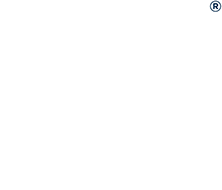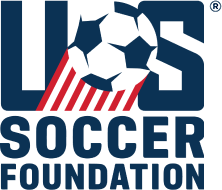
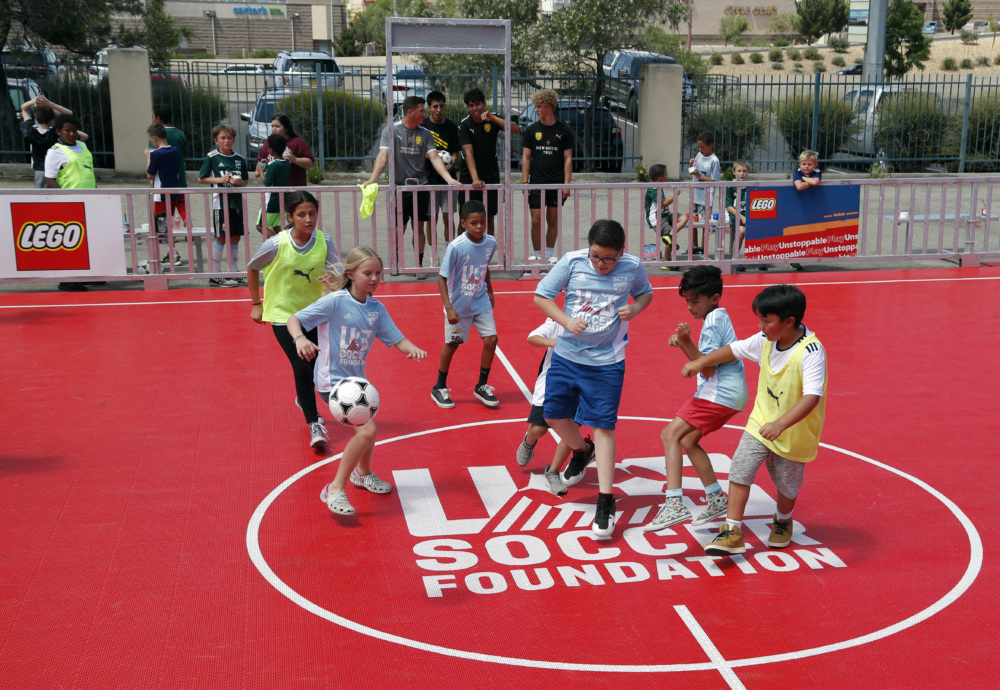
Let soccer do what soccer does.
Together, we can give millions of kids from underserved communities safe places to grow, thrive and build confidence for life.
Changing the Narrative at the Urban Soccer Symposium
The 13th annual Urban Soccer Symposium hosted leaders in the sports-based youth development field from across the nation on March 15-17 in Washington, D.C. Throughout the weekend, attendees were audience to a host of presentations and workshops whose primary messages embodied the event’s theme, “Sport Without Barrier: Changing the Narrative.”
Some attendees started event weekend a day early as they traveled to Capitol Hill to inform their representatives about the work they’re doing in their communities and about various funding priorities. Anna-Lesa Calvert of Algonquin Sports for Kids had a particularly eventful day on Capitol Hill, where she was joined by fellow Soccer for Success colleagues from New York state.
“Sometimes when you’re talking to senators, they really want to hear that the issues that are going on in one part of the state are the same issues that are happening in other parts of the state,” Anna-Lesa recalled. “The great thing about the U.S. Soccer Foundation and having been to the Symposium before is everyone sort of already knows each other and is friendly, so it was an easy ask to say, ‘Hey, do you want to do this together?’”
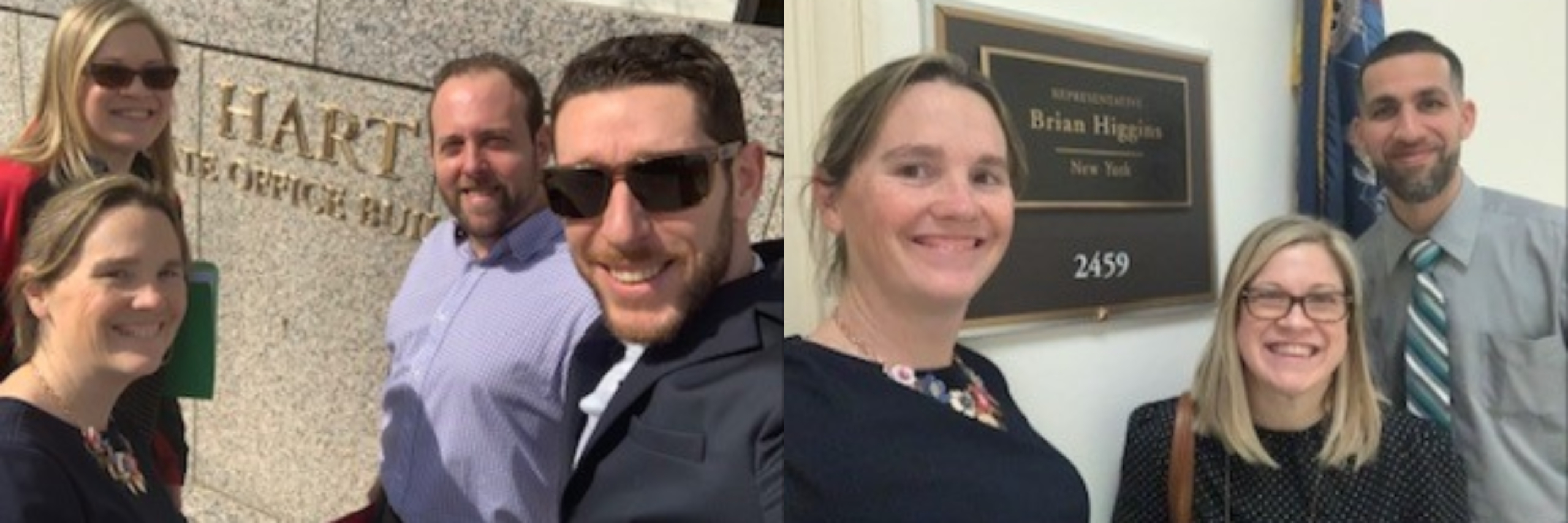
Throughout the day on the Hill, Anna-Lesa and other representatives from YWCA of Syracuse & Onondaga County, Steer for Student Athletes, and NYC Department of Youth and Community Development met at the offices of Kirsten Gillibrand and Chuck Schumer.
“I think the sport for youth development world or concept is building right now, so we wanted to make sure that the people we were talking to knew that the work wasn’t about wins and losses and who’s the best kid, but was really about creating change in our communities that support long-term growth for our areas,” Anna-Lesa explained. “For upstate that’s a little bit different than for downstate. We have different issues in those ways, but at the end of the day, what kind of draws everyone together is that Soccer for Success, specifically for this group, really hits and addresses issues that are happening in all of those communities.”
DAY ONE
The first day of the Urban Soccer Symposium kicked off with opening remarks from U.S. Soccer Foundation President & CEO, Ed Foster-Simeon, Justin Bredeman, President & CEO of presenting sponsor, Soccer Shots, and Diana Cutaia, the event emcee.
Attendees then broke off to participate in their first set of workshops, which featured presentations on topics such as how to recruit and retain women coaches, using a trauma-informed sports framework to create safe spaces, and developing soccer programs that incorporate programming for youth with disabilities.
Some attendees left workshops like these eager to bring what they learned back to their own organizations. Sara Shanley, Special Projects Manager at Kids Play International, found this to be true of the Next Wave Coaching Academy presentation on how to recruit and retain women coaches. “I thought that was really interesting about their model and how to recruit more female coaches,” Sara said. “And I think it’s something we could replicate with our high school students…..It’s interesting to learn what other people are doing because I think so much of it is adaptable and you can tailor it to your own program.”
Founder & CEO of Kids Play International and three-time Olympian, Tracy Evans, felt similarly about the session on bringing trauma-informed sports to organizations. “I think that mental health side of sport obviously is extremely needed…but I was thinking about how it applies in our program in a developing country,” Tracy recalled. “I thought they did a great job of giving us some tangible ways to think about how to apply it…It’s transferable whether you’re working locally here in the United States or globally somewhere.”
The event’s first plenary session began honoring the winner of the 3rd annual Urban Soccer Symposium Innovation Award, presented to We Can Kick It for the organization’s work using soccer as a tool to inspire and empower children and their families affected by cancer.
The plenary session also hosted a panel moderated by Jennifer Brown Lerner, Assistant Director for Policy & Partnerships at the Aspen Institute. Throughout the session, panelists stressed the need for coaches to understand the situations of their participants and to be present as a resource for them, not just on the field, but off the field as well. Jennifer Brown Lerner was joined by Anna-Lesa Calvert, Executive Director of Algonquin Sports for Kids, Simon Chandler, Executive Director of Segundo Barrio Futbol Club, JT Dorsey, Founder of the JT Dorsey Foundation, and Caroline Foscato, Co-Founder & President of South End Soccer.
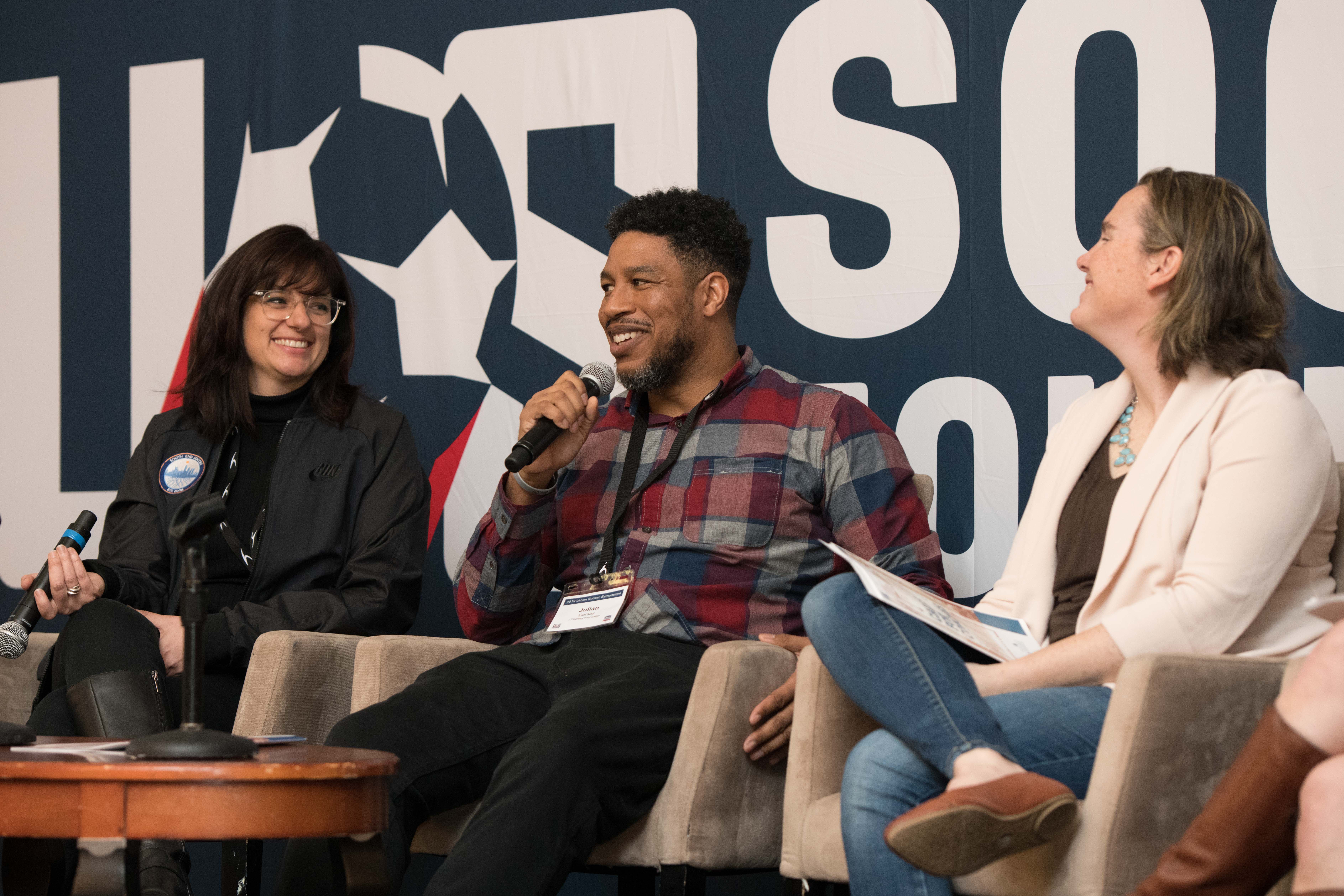
The rest of the day’s workshops fell in line with the theme of understanding the elements that shape players’ experiences in the sport, with topics such as how to create and sustain an environment that welcomes all youth, connecting diverse communities through soccer, inspiring and supporting the next generation of athletes, and how to challenge harmful gender norms through fair play.
To wrap up the day, attendees participated in the Women in Sports Networking Session and Poster Networking Session to connect with other like-minded individuals and share best practices.

DAY TWO
For those early-risers, day two of the Urban Soccer Symposium began with an optional yoga session. Subsequently, attendees heard from featured speaker, Eldra Jackson of Inside Circle. As someone with a difficult past, Eldra spoke to the audience about the importance of sharing emotions. By the end of the session, attendees left with a better understanding of how to create safe spaces that allow their youth to express themselves and their emotions.

Throughout the day, a handful of attendees also spent the day earning their Urban Soccer Diploma, a unique collaboration between United Soccer Coaches and the U.S. Soccer Foundation that provides tools to coaches working in non-traditional soccer settings.
Anthony Wallace, Recreation Specialist at DC Department of Parks and Recreation, left the Diploma feeling reinvigorated and with a newfound dedication to his work. “What it teaches that I won’t learn anyplace else is how to be a more passionate coach,” he said. “That’s something that government doesn’t teach. You have to be empathetic with the folks you’re coaching and interacting with.”

During the event’s second plenary session, Chicago Mayor Rahm Emanuel and Segundo Barrio FC were awarded the Influence and Impact Awards, respectively. Mayor Emanuel was recognized for his role in bringing to life the Chicago Soccer Initiative, while Segundo Barrio FC was recognized for its work using soccer as a tool for social change by developing programs that foster the physical, mental, and emotional growth of youth in the Segundo Barrio neighborhood of El Paso, Texas.
The main event featured members of IntegrateNYC in a presentation and Q&A session as Matt Diaz, Devaun Longley, and Sarah “Zaps” Zapiler shared their experiences in their efforts to ensure that all students have equitable access to after-school athletic activities in the city of New York.

“It is important to always raise awareness about the issues we face,” said Matt, executive high school director of the organization. “There are people who live in New York City that do not know about the injustices embodied in the system they live in. We have to keep showing that the problem is not a definitive; we can make change together.”
“It is so vital that we as youth developers ask the important questions about how we can improve our practices,” says Zaps. “Together, in a community of other committed adults, we can better learn to do the work we really want to do the way we want to do it.”
The afternoon’s events included a host of panels, including how to utilize public-private partnerships to transform the look and feel of neighborhoods, how to increase access to the game by partnering with community-based organizations, and how to mobilize individual philanthropists to give to one’s cause.
The day closed with a final set of workshops, such as how to address challenges of coaching in diverse settings, hosted by J.P. Capote and Keith Lee of the Institute for Sport & Social Justice.

The event’s theme, “Changing the Narrative,” particularly resonated with J.P. and Keith. “We’ve gone to a lot of symposiums and forums throughout the years and that conversation is front and center here where it might not be at other events…You can tell that that’s something that’s valued here,” J.P. said. “Our mission is all about using the power of sport to affect positive social change, so this is a really good marriage actually.”
DAY THREE
Attendees started the final day with former U.S. Men’s National Team players, Maurice Edu and Charlie Davies. Throughout a Q&A session, both athletes stressed the important role that coaches play in developing the player, not just on the pitch, but also as a person and contributing member of society.
Specifically, they both noted that not all players are motivated in the same way and that it’s important to take an individualized approach to coaching young players by getting to know them beyond the pitch.
“Sometimes in order to be able to reach the individual, you have to take a step back,” said Maurice. “Yes, there are team rules: everyone has to be on time, everyone has to put in 100% effort. But from an individual standpoint, how do I reach Charlie, how do I reach Ed, how do I reach the individual, because we don’t all three come from the same background. We’re not all motivated by the same things. We don’t all go home to the same households. When you’re able to connect with the individual, you get a glimpse into what their life is like; you get a glimpse into what motivates them.”
“When you’re able to identify with that and connect with that, I think it gives you a better sense of empowerment, because now, you can better empower the player; you can empower them because you can relate to them better,” he continued. “You can speak to what makes sense to them. You can almost speak their language.”

Charlie concurred, but recognized that getting to know your players on this personal level is no simple task. “It’s not easy. Even the professional coaches struggle with connecting with players individually,” he said. “Coaches fail to treat players differently. Every player is different. I understand holding everyone accountable the same way, but every player is motivated differently. Every player takes information different. So, to be able to connect with them and understand them — understand what’s happening in their off-the-field life — is massive.”
Attendees participated in the final two workshops of the event before returning for the grand finale, featuring 1999 Women’s World Cup champions Lorrie Fair, Danielle Fotopoulos, and Briana Scurry. Throughout the panel, the three panelists spoke to the impact their team had on not only women’s soccer, but women’s sports in general, and how that created a groundswell that has seen international organizations invest more in women’s sports.
Importantly, the panel touched on the theme of the event, “Changing the Narrative,” when the topic of female participation in the sport arose. For each of the panelists, access and opportunity were key.
“I think the two main reasons for the barriers in the first place – it’s always going to be this way to a degree – is geography and economics,” said Briana Scurry. “So, where are the fields, where is the opportunity geographically speaking, and can that child fit there economically speaking…You have to bring it to them and tell them that this is an option…and give them choices.”

“The girls can want to play, but you need supportive parents, you need supportive environments, you need access, you need a whole bunch of things to make it happen,” said Lorrie Fair. “We need to put pressure on those that are making the decisions to have the political will to then provide those opportunities.”
It was a great weekend from start to finish and attendees left the event ready to implement what they learned back in their communities.
Throughout the weekend, attendees from 183 organizations and 31 U.S. states participated in the 2019 Urban Soccer Symposium. Click here for more photos from the event.
